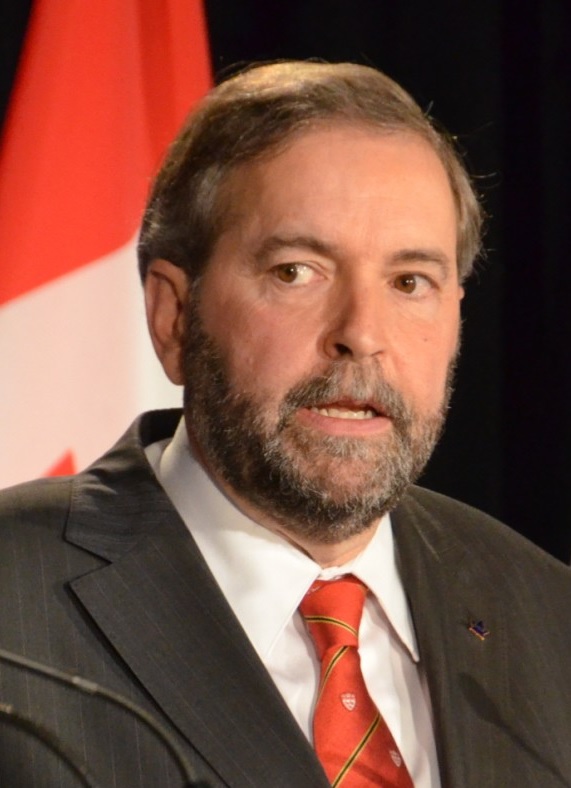At the end of last week it looked like Tom Mulcair and the NDP caucus were going to rise to the occasion on one of the great threats to Canadian civil liberties and Canada’s activist community in many years, Bill C-51.
Bill C-51 is sweeping and dangerous. From the Privacy Commissioner, to commentators like Karl Nerenberg, to Green Party leader Elizabeth May, to the Communist Party, a wide array of people and organizations have denounced and exposed the very disturbing implications of its passage.
Mulcair seemed to say as much and seemed poised to take a strong stance rejecting the bill, which earned him the praise of many — myself included — and which reassured many on the left that Canada’s historically social democratic party was not going to abandon them or let them down.
But in the days since Mulcair first announced his and his party’s intention to oppose the bill, this “opposition” has quickly begun to look far more like a retreat.
Mulcair almost immediately, presumably to reassure Canadians in an election year that he too was “strong on terrorism,” started to sound a position very similar to that of Justin Trudeau who has decided to vote for the bill — namely that it was not the bill itself or a new “get tough on terrorism” bill in general that they oppose, but some aspects of the bill.
After telling Global News that he would not promise to rescind the legislation if elected but would, rather, change it (a position de facto identical to Trudeau’s in that the bill is certain to pass), he also added the further amendment that he would not support the bill without amendments, which by definition means he might be willing to support it with some amendments!
So what are these amendments and changes and what would make the bill (presumably) acceptable to the NDP?
In a response to a constituent who had emailed their MP and had CCed the leader of the NDP (an email that was forwarded to me and the full text of which can be read here), Mulcair says:
Here’s why we can’t support C-51:
– This bill is vague, far-reaching and ineffective.
– Giving CSIS significant new powers without oversight could lead to abuse.
– There is no plan to counter radicalization.
– Because of Conservative budget cuts, CSIS and the RCMP don’t have enough resources to fully enforce the existing laws, let alone the new provisions.
– We share some of the Privacy Commissioner’s serious concerns: https://www.priv.gc.ca/media/nr-c/2015/s-d_150130_e.asp
– We believe the existing laws are sufficient.
Here’s what we think the Anti-Terrorism Bill should do:
– Provide strong oversight of security and intelligence agencies.
– Ensure appropriate resources are available for security and intelligence agencies to track and identify threats to our safety.
– Include efforts to combat radicalization, working with at-risk communities to help counter radicalization.
First, one has to note, these proposed amendments seem to assume the need for new legislation is a real one. Mulcair’s postion can only be read as accepting the premises underlining the bill if not exactly the bill itself as it is now.
Beyond that, however, while calling for more oversight, again exactly as the Liberals are, they also effectively call for actually increasing the resources available to our security and intelligence services. The final (and, I suspect, deliberately vague) provision about including “efforts to combat radicalization” could be interpreted and implemented any number of ways, many of which would actually be quite negative.
He goes on to say:
What’s more, Stephen Harper showed his contempt for the democratic and Parliamentary process by unveiling this bill at a campaign style event. He didn’t give this bill the sober, parliamentary treatment it deserves. And, he’s limited debate in Parliament and limited testimony from stakeholders and witnesses at Committee. We think it’s critical to hear from experts and community leaders to get their input and suggestions. Instead, the Conservatives have chosen to bulldoze ahead with the legislation with little regard for dissenting voices or constructive feedback.
While I think most would agree about Harper’s “contempt” for the democratic process, these comments from Mulcair provide an insight as to what are likely the real objectives of the stance that he is taking, especially when he speaks, nauseatingly, of “sober, parliamentary treatment.”
It is to appear the responsible, mature, Prime Minister and government in waiting that he and his party have sought so desperately to project themselves as. They are not rash and impetuous, they are serious! They are, indeed, ready to govern and to take the helm.
NDP MP Robert Chisholm expressed this outright in a Facebook post when he said, “Standing up for Canadians, proposing solutions, and doing the right thing. That’s how you earn the privilege of government.”
By opposing the bill in one way, while acknowledging the need for and opening the door to it in another, they hope, clearly, to seem to be principled to their base and progressives, while being seen as willing to stand up against “terror” to those voters who have been swept up in the media hysteria and government propaganda and made to feel there really is an imminent threat to our “way-of-life” from terrorists.
They are, rather cynically, trying to play both sides.
Bill C-51 is unnecessary legislation that panders to racism and fear and that will massively enhance the police state. The Tories brought it forward for exactly these reasons. It needs to be fully opposed.
It cannot possibly be amended in any way that will make it acceptable.
Progressives and leftists need to put serious pressure on the NDP to take a truly principled stance against the bill (a bill which, as May said, is “about creating a secret police”) by rejecting it entirely.
Amending or tinkering with a bill this terrible is not really opposing it and is nowhere near good enough.
Photo/Wikimedia Commons



